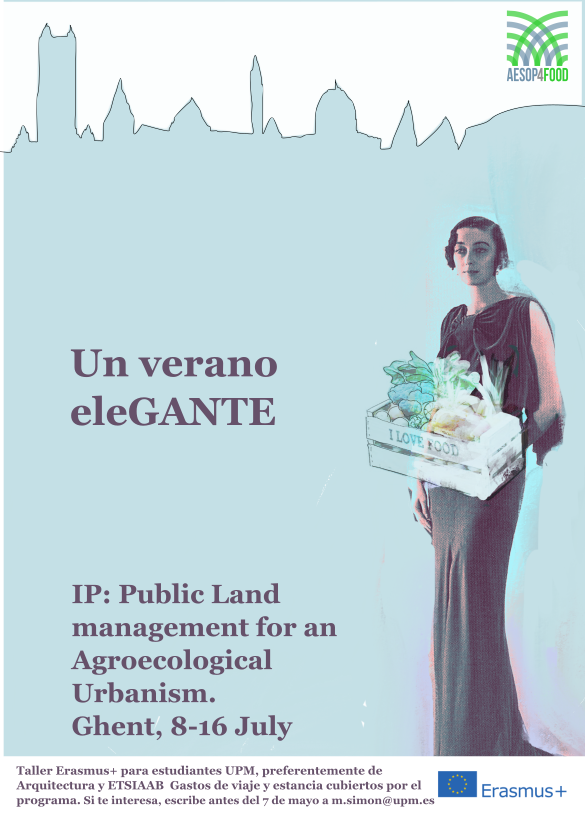Programa intensivo de AESOP4Food en Gante del 8 al 16 de julio
Este verano tendrá lugar el segundo Programa intensivo del Curso Erasmus+ AESOP4Food. Abierto a estudiantes de grado y postgrado de la UPM, preferentemente de las Escuelas de Arquitectura y ETSIAAB (pero no solo, ya que el enfoque es multidisciplinar).
Public Land management for an Agroecological Urbanism
Trabajaremos en Gante, en el corazón de una de las ciudades más premiadas por sus políticas alimentarias, Gent en Garde, A pesar de este compromiso, el Ayuntamiento ha puesto sistemáticamente a la venta tierras agrícolas públicas urbanas y periurbanas. Esto aleja a las y los agricultores que tienen que buscar otros lugares para cultivar. Gracias al trabajo de los movimientos locales (y la Academia) la ciudad ha suspendió temporalmente la venta de tierras agrícolas públicas y está trabajando en la definición de una visión sobre la agricultura en la región. El Programa Intensivo explorará cómo las tierras agrícolas públicas pueden contribuir al desarrollo agroecológico en la periferia periurbana.
El programa cubre los gastos de desplazamiento, alojamiento y estancia de cada participante. Si tienes interés, puedes escribir antes del 7 de mayo a m.simon @ upm.es

OBJECTIVES
During the Intensive Programme we will be exploring 4 positions in particular:
- The shared use of farmland for the harvesting of drinking water and the production of food
Environmental requirements (such as nature objectives, restrictions on nitrogen emissions, water quality levels, …) have far reaching consequences which often infringe upon the way
in which farmers may cultivate the soil. Can we imagine ways in which these requirements would help to accelerate the transition to agroecological forms of farming? Could public farmland be used to both simultaneously serve the harvesting of drinking water and the livelihoods of agroecological farmers. - Healthy Food for the Elderly – Care for the Soil
The bulk of the publicly owned farmland used to belong to monasteries and hospitals engaged in care for the sick and the elderly. These lands are now in the hands of the municipal care service. Today farmland is sold to serve the budgetary crisis of these service, playing social objectives against ecological ones.
Can we imagine public land management strategies that would directly support the food services of these municipal care facilities. - Shared farmers operating infrastructure for nutrient cycling at landscape level
Agroecological farmers in the periurban area are ‘dependent’ famers who face great difficulties to realize the goals of closing loops and regenerative soil care on the level of the farm. This leaves opportunities to facilitate some of these processes ‘at landscape level’ and to rebalance the relation between what happens on and off farm. The development of such relations at landscape level could start with the resourcing of farmers through nutrients harvested in the management of nature conservation areas, as well as the management of trees and hedgerows. - The landed community kitchen – decommodified food from decommodified land
Many initiatives trying to supply food support (food poverty) rely on surplus food from supermarkets. Some initiatives have also tried to source food waste. This leads to the contradictory situation that efforts to correct the failures of the food system are sourced through the failures of the food system. It is challenging to make durable connections between food initiatives serving social objectives, with ecological objectives and access to locally sourced, fair, ecologically based, and healthy food supply.
The imaginary of the landed community kitchen seeks to link neighbourhood-based initiatives with agroecological farmers, building solidarity across the urban rural divide.
En el programa Erasmus+ AESOP4Food participan:
- LE:NOTRE Institute (coordinating institution) an international foundation based in Wageningen, Netherlands
- Universidad Politécnica de Madrid – Madrid, Spain
- Spanish network of municipalities for agroecology – Spain
- Ghent University – Ghent, Belgium
- Warsaw University of Life Sciences – Warsaw, Poland
- Pracownia Dóbr Wspólnych – Poland
- Montpellier Supagro – France
- Terres en Villes – France
